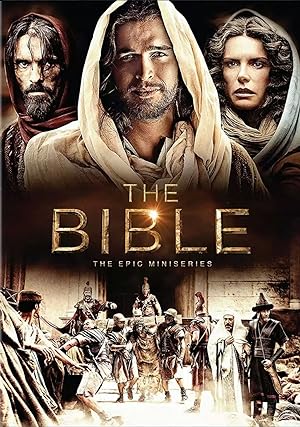If you’re going to do a film/tv project on the Bible or ANY written work, you have 2 choices: be emotional authentic even if it is not a faithful adaptation (think of the tv series, Kings) or be a faithful adaptation so that fans of the work can’t complain. If you’re emotionally authentic and surround yourself with powerful actors, then you can get away with casting a Swede as Jesus. Unfortunately this mini-series largely failed on both counts. Main problems: they don’t get the book that they are adapting (Roma even admitted in the special features that they found the Old Testament difficult to adapt), and the executive producers, Simon Burnett and Roma Downey, had slightly different objectives. He wanted to make something that kids would find visually stimulating. She wanted to use it as a conversion tool. Here are just a few of their major film sins. The casting: a lot of Europeans instead of people from the Middle East, and when they aren’t European, the (hopefully) accidental negative racial commentary is slightly appalling. They did not use some of the most beautiful lines already written in the Bible which SHOULD have had a historical resonance for any European who has a slight understanding of WWII history when retelling story of Shadrach, Meshach & Abednego in the fiery furnace (“And if not…”). It is like adapting Hamlet and rewriting the “To be or not to be…” speech. Why would you set yourself up for failure? The pacing: some stories went by at such a rapid pace, it was embarrassing. Literally Adam rose from the ground, the flood occurred & we were up to Abraham after 10 minutes in the first episode. They sanitized the Bible, which I like to call the Sunday school approach-we’re not 5 years old so we can handle the fact that not every person in the Bible is supposed to be a hero or perfect. You don’t have to spin it and make a bad act seem like it was good or not show it. Be raw and human. Seriously, the guy playing Jesus did not genuinely flip the tables. Flip the freaking tables! You don’t have to be serene all the time. Finally, God is not really a major character in The History Channel’s The Bible, which is weird since the executive producers admitted that they weren’t going for a historical approach, but just adapting the story. God largely appears in every Biblical story except for a few books of the Bible such as Esther. There was more action than substance in this retelling. It was like Supernatural without the dialogue or story arc. Cool unique moments (far and few in between): representation of angels, willingness to approach Saul as someone who was sane and then underscore the real violence of his transformation; focusing on the horrors of the exile; attempt to tie in Isaiah; Holy Spirit and representation of tongues. The strongest section was the final episode, which shows me that the executive producers lost an opportunity to tell one story simply and well thus they could have accomplished their goals if they were less ambitious. Lost opportunity, but it has inspired me to rewatch one of the most amazing adaptations: TNT’s The Bible Collection, which found a new fresh way to tell these well-known stories and was emotionally authentic AND faithful.





